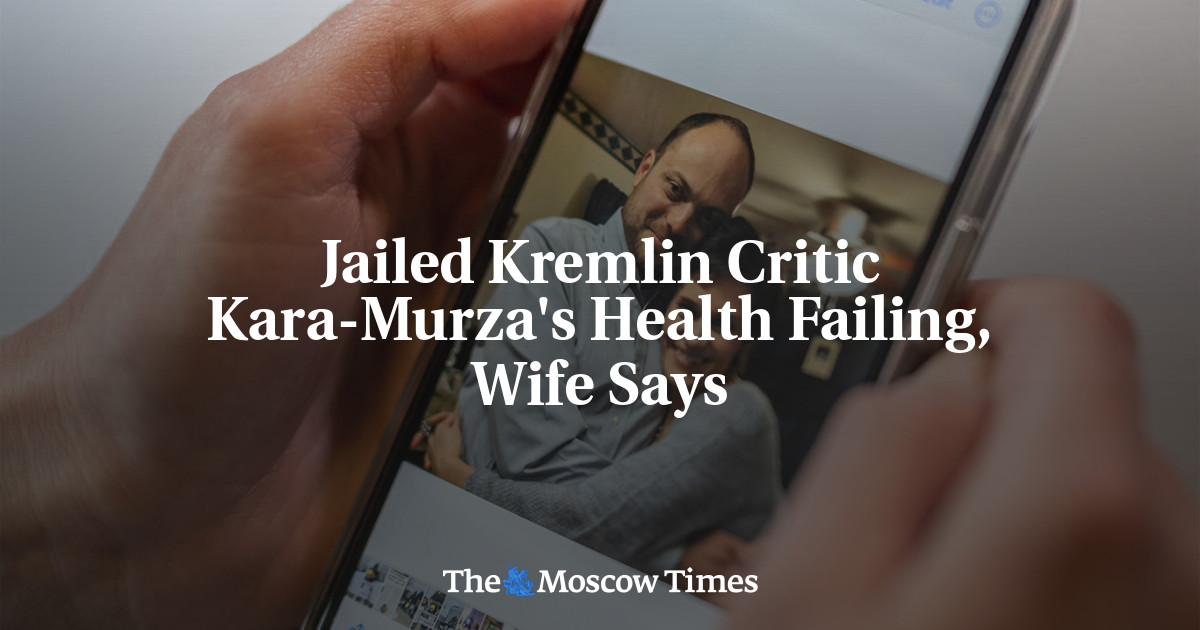
The wife of Kremlin critic Vladimir Kara-Murza voiced deep concern Wednesday at his failing health behind bars, hailing his courage in the face of an act of “cynical vengeance” by Moscow.
“I am obviously concerned,” Evgenia Kara-Murza said in an interview with AFP. “His health indeed is failing.”
Her husband had serious health issues even before he was detained last year, suffering from a nerve condition called polyneuropathy which she said is due to two poisoning attempts in 2015 and 2017.
During the past year in pre-trial detention his condition has deteriorated significantly, she said, warning that with a harsh sentence now imposed, the situation would certainly worsen.
Kara-Murza, 41, was sentenced last month to 25 years in a high-security prison on treason and other charges for criticizing Russia’s war in Ukraine.
He has appealed against the sentence — the longest given to a Russian opposition figure in recent years — but his wife said she “of course” expected it to be rejected.
She pointed out that Russian law barred the incarceration of people suffering from polyneuropathy, which can lead to paralysis, but that the “Russian authorities were not bothered by this.”
Aimed ‘to kill’
Speaking to AFP on the sidelines of the Geneva Summit for Human Rights and Democracy, Evgenia Kara-Murza voiced anger at her husband’s sentence.
“It is pure and cynical vengeance by the Russian government,” she said, pointing out that Kara-Murza’s judge and the head of the prison where he is detained were subjected to sanctions that he had been pushing the United States and Europe to impose.
He contributed to the adoption of the Magnitsky Act, a U.S. bill intending to punish Russian officials responsible for the death of Russian tax lawyer Sergei Magnitsky in a Moscow prison in 2009.
“The regime clearly sees my husband as its personal enemy,” she said.
“Twice in the past… our kids almost lost their father,” she added, saying he was poisoned in attempts “to kill, not to threaten.”
Despite the dangers, she said her husband had not hesitated to return to Russia and that she supported his decision.
“Of course it makes me scared for his life,” she said, her dark eyes filling with tears, pointing out that “Vladimir and I have been carefully building our little world for years: our kids, our family.”
“But I know what he’s fighting for,” she said, adding that “through all of these risks, through all of the attacks,” he had remained “true to himself.”
“If I accepted him the way he is over 20 years ago, it would be quite hypocritical of me to ask him to change now. That would not be Vladimir.
“The only option for me is to stand by him and fight with him and fight for him.”
‘Cracks’
She acknowledged the situation was “excruciatingly painful” for the couple’s three children, but said Kara-Murza “somehow manages to continue being a good father to them even from behind bars.”
“He’s teaching them a very valuable lesson: that they should face bullies with courage, that they should never give up without a fight, that they should accept the risks… acknowledge them, and still fight despite those risks.”
Asked if she thought others would dare follow his example, she pointed to the “20,000 people arbitrarily detained” since Russia launched its full-scale invasion of Ukraine in February 2022.
That so many people had dared protest at a time when “the regime is using the entire arsenal of Soviet-style repressive techniques against anti-war protesters,” she said, meant that “there are probably millions who are against the regime, but are afraid to speak up.”
In the Soviet era, “mass protests only became possible when the regime started showing cracks,” she pointed out, confident that “it will happen… when Putin’s regime begins showing cracks.”
As for when that might happen, she suggested a clear Ukrainian victory could, after “over two decades of impunity by Vladimir Putin’s regime… finally send a signal to the Kremlin that it will not get away with committing such crimes anymore.”